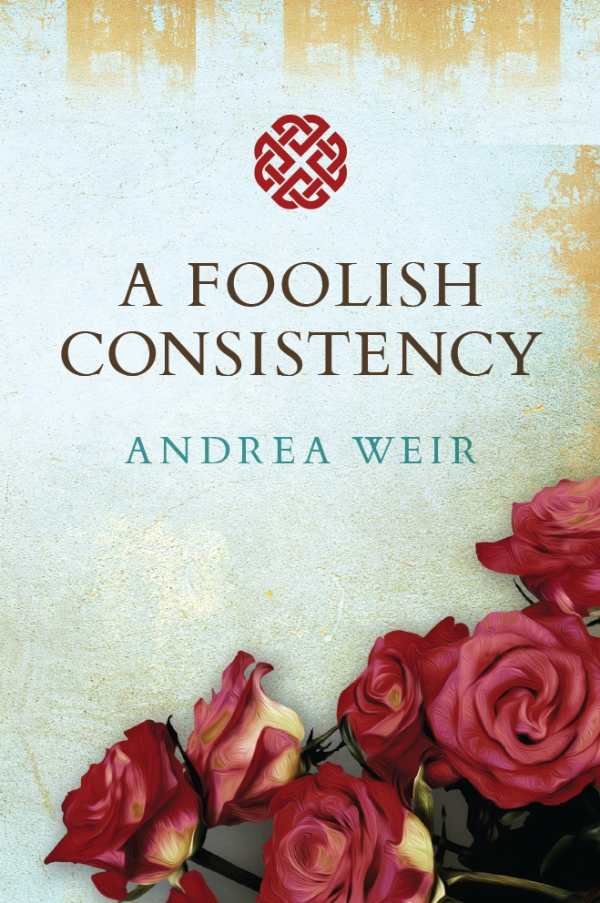A Foolish Consistency
- 2014 INDIES Finalist
- Finalist, Romance (Adult Fiction)
Weir takes a traditional romance to the next level by not glossing over the delicate choices involved in starting over at love and commitment.
In A Foolish Consistency by Andrea Weir, recent divorcée Callie Winwood unexpectedly reconnects with her college sweetheart, widower Dr. Will Tremaine, twenty-plus years after they went their separate ways into adulthood. With detail and precision, Weir crafts a quality romance that explores the emotional intricacies that come along with blending families and second chances.
Callie and Will are both weighed down by the baggage of their past relationships. Callie is amicably divorced from her ex-husband but knows deep down that she is—and perhaps always has been—afraid of giving herself over to true intimacy. Will’s wife, Joanna, died in a car crash he suspects was no accident, as she suffered from intense bouts of mental illness. To help his two young children maintain a connection with their mother, Will allows them to spend time with Joanna’s wealthy and manipulative family—until his former in-laws begin meddling with his newly rekindled relationship with Callie. Though Will and Callie know their connection is real, when their children’s happiness is at stake, they begin to question if love really is enough.
Weir takes a traditional romance to the next level by not glossing over the delicate choices involved in starting over at love and commitment. Will must consider how his love for another woman might interfere with his children’s grieving process; Callie, with two grown children, wonders if she is willing to give up the new life she has created for herself since her divorce. Those who have weathered similar storms will appreciate how realistically Weir presents the weighing of these decisions.
Though the plot is quite simple, Weir does a fine job maintaining tension, primarily through the characters of Eleanor and Rowan, the deceased Joanna’s mother and sister. These antagonists try to thwart Will’s relationship with Callie at every turn, but their misguided actions are easy to sympathize with, as they, like Will and his children, are still grieving. Though there are moments when it feels as though the conflicts that arise really shouldn’t be all that difficult to overcome, Weir manages to effectively draw out the important thread that the decisions involved in bringing families together truly can be gut-wrenching.
The narrative is very detailed, and it’s possible that some may wish for less talk and more action. Most readers, however, will likely savor the attention given to everyday life—to a good cup of coffee, to the smell of cinnamon rolls baking, to the way that certain someone looks in his t-shirt and jeans. With patient reading, these moments can offer a reminder of the small, beautiful things so easily taken for granted in day-to-day life.
Love scenes are tasteful, perfect for those who like a little sexy romance with their family drama. The volume is professionally packaged and well edited. There is some awkwardness, however, with shifts between Callie’s first-person storytelling and the third person used for other perspectives, primarily Will’s. There are also a few instances where paragraph breaks make it difficult to determine who is speaking a line of dialogue, but on the whole, the confusion is fairly minimal.
The book ends satisfactorily, but without full resolution as to how Callie and Will intend to initiate the next move toward bringing their families together. Readers may hope that Weir intends a sequel that further explores how the couple makes things work in the trenches of their everyday relationship.
Reviewed by
Margaret Fedder
Disclosure: This article is not an endorsement, but a review. The publisher of this book provided free copies of the book and paid a small fee to have their book reviewed by a professional reviewer. Foreword Reviews and Clarion Reviews make no guarantee that the publisher will receive a positive review. Foreword Magazine, Inc. is disclosing this in accordance with the Federal Trade Commission’s 16 CFR, Part 255.

